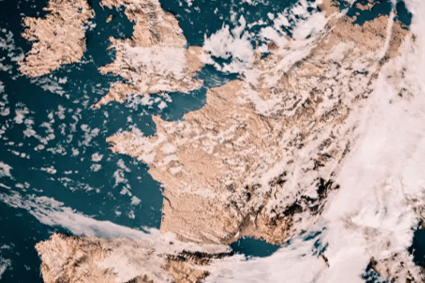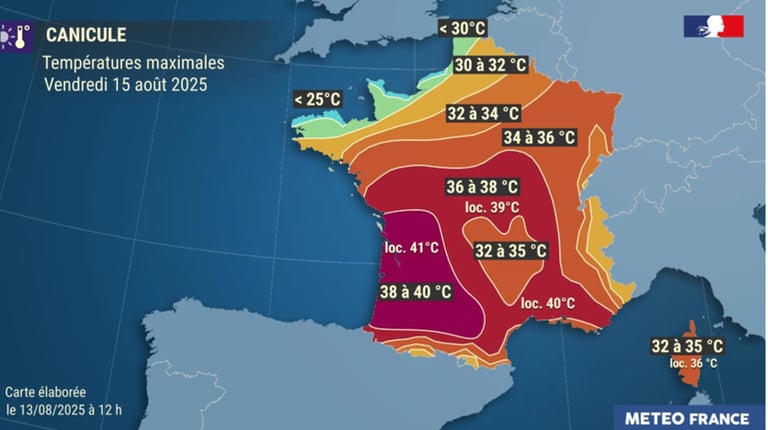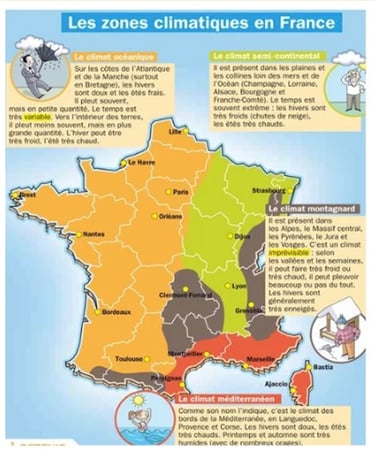Thinking of Moving to France? What Expats Need to Know About French Climates (and some weather vocab)
Moving to France? Discover France’s four climates, the impact of climate change, and expat tips for choosing the right region. Learn practical French weather vocabulary and prepare for life in France.
[BEGINNERS] ESSENTIAL FRENCHTIPS FOR RELOCATING IN FRANCE
9/18/20255 min read


Oceanic Climate (West, Northwest France – Brittany, Normandy, Nantes)
Mild winters (5–8 °C), rare snow, and cool to warm summers (17–20 °C). Rain is frequent across the year, skies often overcast, and wind is common along the coast. Foggy mornings that may—or may not—clear by afternoon. Great if you like less heat and more green landscapes. (For up-to-date forecasts and rainfall maps, check Météo France.)
Semi-continental / Continental Climate (East: Burgundy, Alsace, Lorraine)
In cities like Nancy, Strasbourg, Besançon, or Dijon, winters are cold: daytime temperatures often around 0–2 °C, nights dropping below freezing, and snow several days each winter. Fog in valleys, long nights in December. Summers are warm to hot: average highs around 25–30 °C, and during heat waves it isn’t unusual to hit 35–36 °C or more. Thunderstorms happen. The air can become heavy in hot nights, and without the moderating influence of the sea, things feel more intense.
By the way, for reliable short-term forecasts—rain risk in the next hour, or thunderstorm alerts—I recommend Météo France. And if you’re in Burgundy like me, you can rely on the hyper-local expertise of Préviplus Côte-d’Or, which gives incredibly precise storm tracking and weather predictions. A must for anyone living here!
Mediterranean Climate (South: Provence, Marseille, Nice)
Think Provence, Marseille, Nice. Winters are mild—around 8–12 °C, snow almost never at low altitude. Summers are long, hot and dry: 30–35 °C is common, with many sun-filled days. Nights stay warm. Rainfall is mostly in spring or autumn; summers are very sunny. You may feel heat strongly, but you’ll also get more consistent sunshine and dry air.
Mountain / Alpine Climate (Alps, Pyrenees, Jura)
High regions such as the Alps, the Pyrenees, or the Massif Central in central France, offer a very different experience. Winters are long, very cold with heavy snow and bitter nights. Summer is short and cooler—if you’re up in altitude, even July or August mornings can be chilly. Weather changes fast: sunny mornings can lead to storms; hail during your nice and warm hiking afternoon. And snow can still happen in spring or autumn. Also be aware that UV exposure at high altitude is stronger.
Climate Change: Why Summers in France Feel Different Now
Many English or American expats assume that because places like Alsace or Lorraine have colder winters, they’ll be cool year-round. Not so. Indeed, recent years prove otherwise. Just check at this map (credits: MétéoFrance):
The number of heatwave days ("canicules") in France has increased significantly. For instance, the summer of 2019 saw 18 heat wave days, 2022 had about 24, and 2023–2025 continue with multiple such summers. It’s rare now to have a summer without at least one heat wave in many inland or southern regions.
Temperatures above 35°C are now more common in the Easter regions of France (just like in Marseilles or in Corsica for instance.. but without the sea to dive in!). This year of 2025, my outdoor thermometer went up to 39.8°C... which is even more than 103°F.
Nights are warming too: the cool evening drop that once offered relief in hot regions is less reliable—hot, stuffy evenings are frequent.
Also, with increasingly frequent heat waves and overall hotter summers, some regions like Normandie or Bretagne, which used to be unpredictable in summer (often rain, sometimes cool), are becoming much more pleasant—sunny days with mild warmth, not burning heat.
Practical Tips for Expats: Choosing Where You’ll Actually Be Comfortable
Check summer peaks: Ask how many days per year over 35 °C the city experiences. If it’s common, check if the housing has cooling solutions (fans, shade, good airflow). "Climatisation" (air conditioning) is still rare in many French homes, especially in older or central-city buildings; more common in newer builds or rural houses with renovation.
Think about winter light: In semi-continental and continental regions, night falls early in winter. For example, by December, darkness may come around 16:30—often when children return from school (to read more about school in France, check this article). Choose housing with good windows and daylight exposure.
Avoiding surprises about humidity: If you dislike damp and mold, interior regions with continental or mountain climates will test you. Oceanic climates are moist most of the year; Mediterranean coastal zones are drier in summer... but more at risk of fires.
Altitude & geography matter: Mountain valleys may trap fog; higher altitude means more snow and rapid weather changes.
Housing quality: Insulation, solid windows, heating system are essential. An older home without good double glazing or roof insulation will leak heat in winter and trap heat in summer.
What to pack: Layers, waterproof items, a warm coat and hat for winter, breathable fabrics for summer, sun protection. Be ready for a mix—occasionally snow or frost in winter, sometimes unexpected heat waves in summer.
Vocabulary: Talking About the Weather
Il fait froid → It’s cold
Il fait chaud → It’s hot
Il pleut → It’s raining
Il grêle → It's hailing
Il va pleuvoir → It’s going to rain
Il y a du vent → It’s windy
Il y a un orage → There is a storm
Il fait beau → It’s nice weather / It’s nice out
Il fait moche → The weather is miserable
Il y a du soleil → It’s sunny
La canicule → a heat wave
La climatisation → Air-conditionning
For more useful vocab, download my list of the 1 500 most useful words every expat needs right here.
It's all about fitting your needs
Deciding where to live in France isn’t just about must-see spots—it’s about how the daily weather fits with your rhythm: heat, light, seasons, change. As someone from Nancy who has lived through 4 real seasons, I’ve come to believe it’s these weather details that either make a place feel like home or not.
If you’re preparing to move to France, I cannot help you with the weather. But, I can definitely help you build your French skills so you feel at home in any weather! Book your online French lesson today and get ready to feel comfortable from your first winter night to your first summer barbecue in France.


When I lived in the UK, I used to joke that the clouds change more often than traffic lights. Coming back to France, I expected more stability. As someone born in Nancy (Lorraine), used to very hot summers (yes, really hot and without air conditioning!) and cold winters, who has lived in Canada and now lives in Burgundy in Dijon, I know how the weather can affect your daily life—and I know climate impacts your relocation choice more than many people realize.
If you’re an English or American thinking of relocating here, climate will influence your comfort more than you imagine. In this article, I break down the main climate zones, show how climate change is altering them across France, and give you practical tips (and vocabulary) so you can decide not just with your heart, but with your thermometer.
The Four Climate Zones in France:


I like this map because it sums up really easily the 4 main climate zones in France.
What needs to be taken into account is basically:
the proximity of the ocean West/East axis
the North/South axis
if it is located in mountains or not
All these 3 factors together will have an impact on the climate of your zone.
Clémence PARIS
Langue et communication
Contact:
© 2024. All rights reserved.
Legal notices
General conditions of sale
Data protection
E.I Clémence Paris Langue et Communication
SIREN 934 245 812
SIRET 93424581200011
TVA INTRACOMMUNAUTAIRE : FR 48934245812
